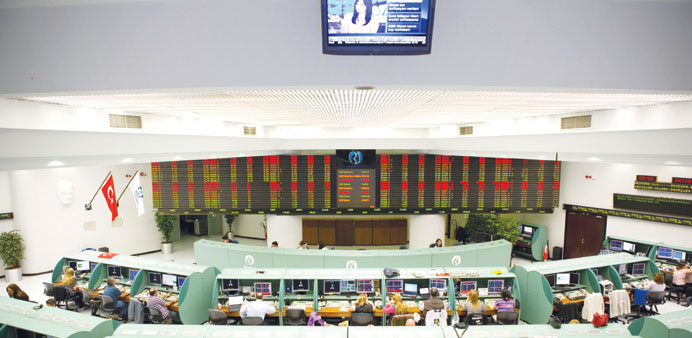Traders are seen working on the floor of the Borsa Istanbul, the stock exchange in Istanbul (file). EBRD signed a preliminary deal on May 29 to buy a 10% stake for an undisclosed price from Borsa Istanbul. The investment plans for this year are the EBRD’s largest yet for Turkey and among the biggest of any country where the bank operates.
Bloomberg/Istanbul
The European Bank for Reconstruction and Development is set to make record equity investments in Turkey this year, even as the country awaits the formation of a government and confronts regional instability.
The EBRD, as the London-based lender and investor is also known, will have €300mn ($329mn) to €400mn of investments in Turkish assets this year, Jean-Patrick Marquet, its country director, said in a July 30 interview in Istanbul. These include minority stakes in Borsa Istanbul, Turkey’s sole stock exchange, and renewable power producer Gama Enerji, he said.
The bank aims to increase its Turkish lending and investments to €1.75bn from €1.4bn in 2014, even as political parties struggle to form a government after June elections ended more than a decade of single-party rule. While uncertainty clouds domestic politics, Turkey is striking at Kurdish rebels and Islamic State militants in its Syrian and Iraqi neighbours.
The investment plans for this year are the EBRD’s largest yet for Turkey and among the biggest of any country where the bank operates, Marquet said. “I am very hopeful that we will sign a large amount of equity this year.”
EBRD has invested €880mn in 17 projects in the first half of 2015, Marquet said. “We are exactly on track for our plan for the whole year.”
The lender signed a preliminary deal on May 29 to buy a 10% stake for an undisclosed price from Borsa Istanbul as the government prepares the company for an initial public offering next year. The bank is considering a $105mn investment for a minority stake in Ankara-based Gama Enerji. International Finance Corp, the World Bank’s private industry investment arm, bought a 27%-stake from Gama Enerji in July for an undisclosed price.
Negotiations with asset owners are “challenging” in Turkey at the moment and sellers need to recognise that conditions aren’t as favourable as they were as recently as two years ago, Marquet said. Longer term, the country remains a positive investment destination, he said.
“The key reason why we are investing heavily in Turkey is that we believe the fundamentals for long-term investment and growth are strong,” Marquet said. “We see demand for our long-term finance and know-how in the sustainable energy field, infrastructure and in the private sector.”

